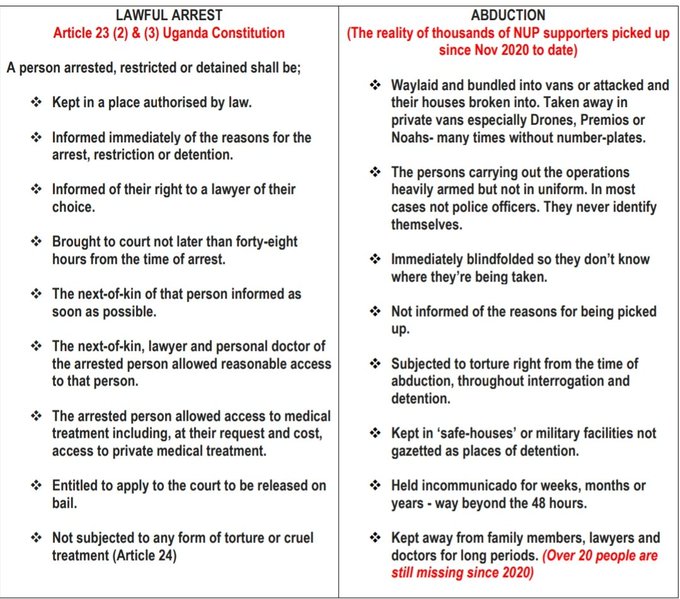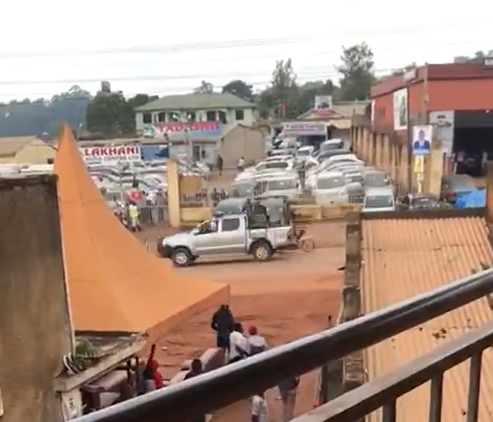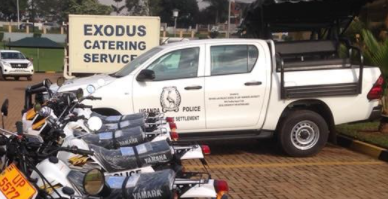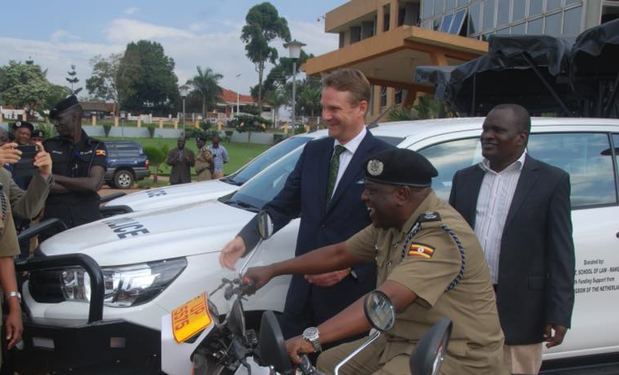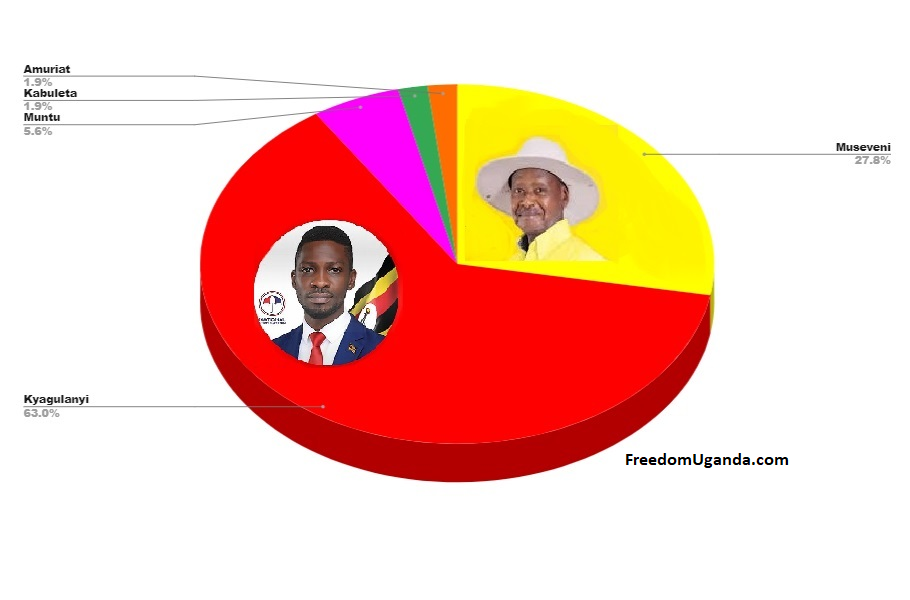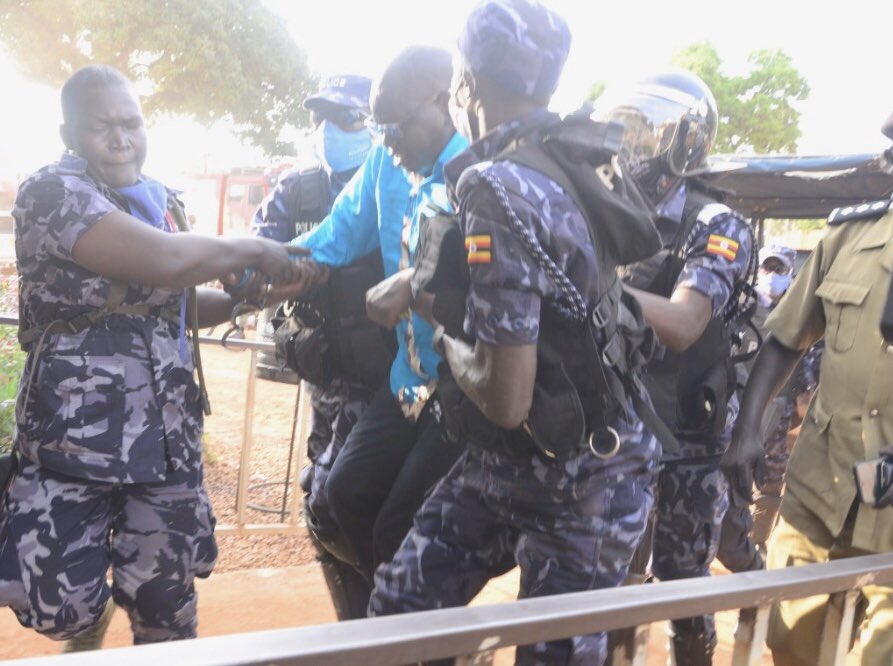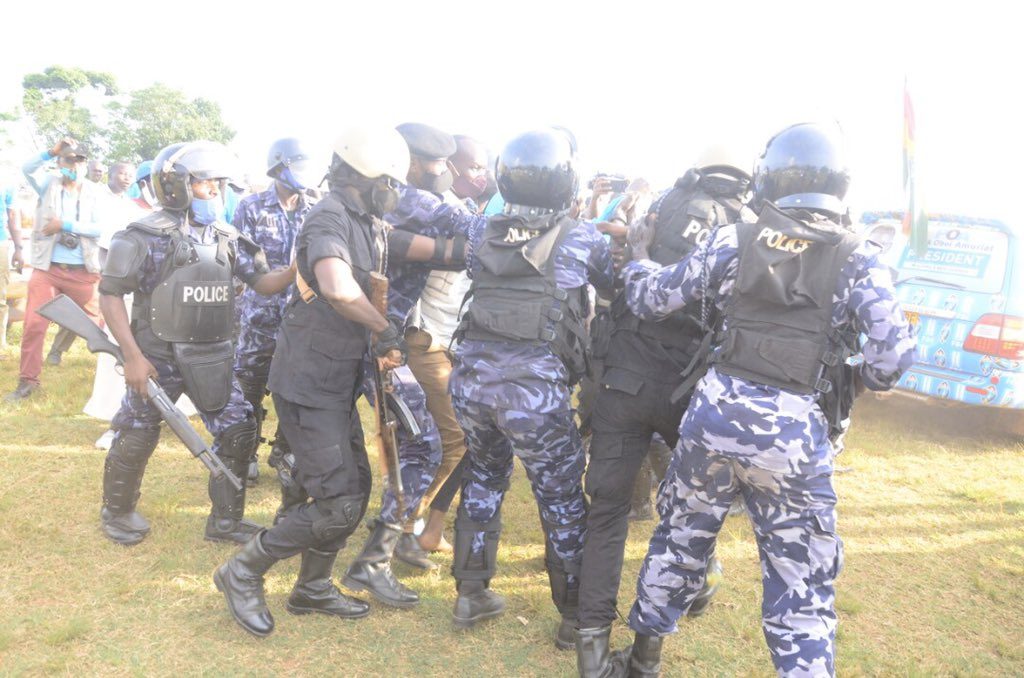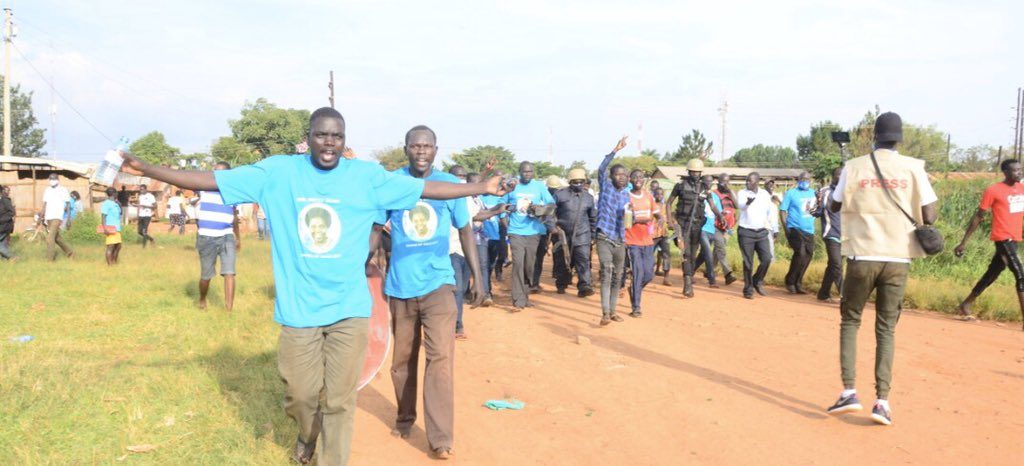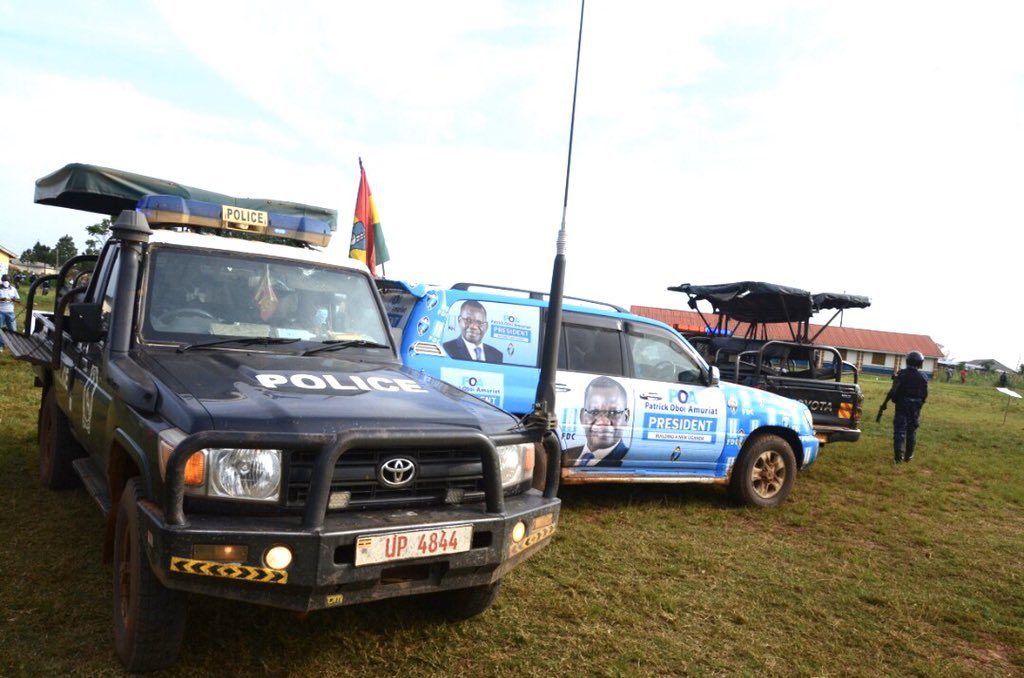Answering questions from members Simons and Sjoerdsma about the human rights situation in Uganda
Dear President,
We hereby offer the answers to the written questions asked by members Simons and Sjoerdsma about the human rights situation in Uganda. These questions were submitted on February 22, 2022 with reference 2022Z03335.
The Minister of Foreign Affairs,
WB Hoekstra
The Minister of Foreign Trade and Development Cooperation,
Liesje Schreinemacher
Our ReferenceBZDOC-1080387994-68
Answers from the Minister of Foreign Affairs and the Minister for Foreign Trade and Development Cooperation to questions from members Simons (Bij1) and Sjoerdsma (D66) about the human rights situation in Uganda.
Question 1
Did you read the interview with Ugandan opposition leader Bobi Wine in the NRC under the title “Stop making the dictator in Uganda powerful?”1
Answer
Yes.
Question 2
How do you respond to Bobi Wine’s message that Museveni is responsible for large-scale police brutality, ballot box fraud and torture? How will this affect the relationship between the Netherlands and Uganda? And how do these relate to the trade interests that the Netherlands has with Uganda?
Answer
Large-scale police brutality has taken place in Uganda in the run-up to the 2021 elections2. We also learned from various reliable sources that torture had taken place.
The EU High Representative took note of the election results in a public statement on 20 January 2021, expressing deep concerns about the role of the security services, internet restrictions and intimidation of political actors and civil society.
The Netherlands has also repeatedly expressed concerns about the deteriorating situation, such as recently during the visit of the Minister for Foreign Trade and Development Cooperation. The broad relationship between the Netherlands and Uganda is mainly aimed at increasing prospects for the population, the reception of one and a half million refugees and the further strengthening of economic relations. Partly because of this broad relationship, the Netherlands has the opportunity to raise worrying developments with Ugandan authorities. See also the answer to question six.
Question 3
To what extent and in what way are you taking diplomatic action to free the two NUP parliamentarians, who have been imprisoned since the summer on charges of terrorism and murder without any evidence? Can you explain this further?
1 https://www.nrc.nl/nieuws/2022/02/15/stop-museveni-macht-te-maken-a4089557
2 See the answers to parliamentary questions from MP Kuik, dated 10 February 2021, Appendix to the Acts 2020-2021, issue 1642
3 https://www.consilium.europa.eu/en/press/press-releases/2021/01/20/uganda-declaration-by-the-high-representative-on-behalf-of -the-european-union-on-the-elections/
Answer
In the context of the EU, the Dutch embassy has made inquiries about this matter with various authorities. Because this is an ongoing case, the Ugandan government does not provide any explanation.
Also in the context of the Dutch presidency in 2021 of the so-called JLOS donor group (the group of donors that provides support to the Justice, Law and Order sector: the entirety of 18 government institutions in the field of the judiciary, the police and the prison system), the Netherlands has spoke regularly to the Ugandan authorities about the importance of respecting the constitution within the justice chain. The Netherlands will continue to make bilateral and EU inquiries about the detention of the two NUP parliamentarians and insist on a timely and fair trial.
Question 4
What considerations do you make when visiting and supporting political prisoners and prisoners of conscience (via the Dutch embassy) under Museveni’s rule?
Answer
See the answer to question 10.
Question 5
What considerations do you make in the choice to publicly condemn human rights violations committed by the Museveni regime and to combat them in a bilateral or EU context?
Answer
Over the past two years, the Netherlands has regularly spoken out about the poor human rights situation and the shrinking social and political space in Uganda. The Netherlands has a preference for working together with EU Member States and with other like-minded partners – for example the US or the UK – because the message gains weight as a result. A recent example of joint action is the local EU statement of 7 February on torture
In addition, the Netherlands also expresses itself bilaterally critically if the situation so requires. The Netherlands also does this behind closed doors, such as in the recent meeting of the Minister for Foreign Trade and Development Cooperation with the Ugandan Prime Minister and the Ugandan Minister of Foreign Affairs, or publicly, as recently in the context of the UN Universal Periodic Review. Human Rights Council.
Question 6
What conditions in the field of human rights, democracy and good governance do you attach to bilateral (development) aid and what consequences do you attach to non-compliance with these conditions? Can you explain this with examples?
4 https://twitter.com/EUinUG/status/1490570507049132033
Reply
The Netherlands attaches great importance to respecting human rights, preserving democratic space and good governance. In contacts with the Ugandan authorities, the Netherlands has therefore emphasized that negative developments could have consequences for Dutch efforts where they directly benefit the government, in line with previous decisions such as maintaining the final payment (of €850,000) of the now recent partnership with the aforementioned JLOS sector. This payment will remain on hold until it is clear how the government is working on accountability with regard to police brutality surrounding the elections. Also, the effectiveness of the cooperation with the JLOS sector as a whole, including in the context of the deteriorating situation, is currently being evaluated.
Question 7
Is it true that the last national elections were not under international supervision?
Answer
The elections were observed by delegations from the East African Community (EAC) and the Intergovernmental Authority on Development (IGAD). However, there was no formal EU monitoring mission. Employees of EU embassies, including the Dutch embassy, did visit polling stations on election day.
Question 8
Can you advocate that the next Ugandan national elections be supervised by an international observation mission to monitor democratic principles? If not, why not?
Answer
In general terms, the Netherlands endorses the importance of international observation missions and will work within the EU to ensure that the EU is able to observe the next elections in Uganda. However, this requires that the Ugandan authorities formally invite the EU. The Netherlands will also endeavor to achieve this in its contacts with the authorities.
Question 9
To what extent and in what way are you committed to ensuring that the Ugandan authorities adopt and implement the recommendations of previous international observation missions?
Answer
In the run-up to the 2021 elections, the EU and like-minded partners have been working at a technical level with the Ugandan authorities to implement the 2016 election observers’ recommendations. The next national elections are scheduled for 2026. to use the lessons of the previous elections in the preparation and observation of new elections.
Question 10
Is it true that the Dutch ambassador is not open to visits to Ugandan prisons? If so, why not?
Answer to questions 4 and 10
No, that is not correct. The Dutch ambassador is open to that. Employees of the Dutch embassy in Kampala also visit Ugandan prisons. However, for the past two years, visiting prisons has been difficult and sometimes impossible. This was due to the COVID-19 pandemic and the massive overcrowding of the prisons that closed them to outsiders. In addition, the embassy is actively involved by attending court cases against human rights defenders.
Question 11
How do you view the level of violence used by the Ugandan authorities to stifle political opposition?
Answer
The Netherlands is deeply concerned about the increased violence and the growing restriction of social and political space and has raised these concerns regularly and at a high level. For this reason, the Netherlands is actively committed – with diplomatic efforts via bilateral and multilateral tracks and with financial support to organizations in Uganda – to promote human rights and preserve social and political space.
Question 12
To what extent does the Netherlands cooperate with European and American partners in Uganda to improve judicial power in Uganda?
Answer
The Netherlands, together with other donors, has been contributing to the JLOS program mentioned above for 20 years. Government capacity building and strengthening the government’s commitment to strengthen the entire chain have been important considerations for working with the government. Moreover, this cooperation offers additional avenues to address issues such as human rights violations, impunity and corruption, both at a technical and higher level.
The last agreement with the JLOS sector, with a Dutch contribution of EUR 17 million, ran from 2017 to the summer of 2021. Since 2015, support to the JLOS program has been limited to activities aimed at clearing backlogs in lawsuits (case backlog), facilitating specific lawsuits on sexual and gender-based violence, children’s rights, refugee law, transitional justice and commercial justice. As stated in the answer to question 6, an evaluation of the past Dutch support to the JLOS program is currently being carried out, also in order to be able to take a sound decision about a possible continuation of the Dutch cooperation.
Question 13
Are you prepared to take a proactive role in promoting dialogue between the Ugandan government, the European partners and the United States to stop the human rights situation and gross violations by the police force?
Answer
Yes. The Netherlands has been doing this for quite some time. The Netherlands, for example, committed itself to this, in the context of the previous chairmanship of the JLOS donor group, in discussions about the substance of the EU’s political dialogue with the Ugandan authorities, during various consultations with like-minded partners at capital city level and in the context of of the EU Council Working Group on Africa. The Netherlands has campaigned within the EU for a speedy visit to Uganda by the EU Special Representative for Human Rights.
—- BELOW IS THE ORIGINAL TEXT IN DUTCH —
Beantwoording vragen van de leden Simons en Sjoerdsma over de mensenrechtensituatie in Oeganda
Geachte Voorzitter,
Hierbij bieden wij de antwoorden aan op de schriftelijke vragen gesteld door de leden Simons en Sjoerdsma over de mensenrechtensituatie in Oeganda. Deze vragen werden ingezonden op 22 februari 2022 met kenmerk 2022Z03335.
De minister van Buitenlandse Zaken,
W.B. Hoekstra
De minister voor Buitenlandse Handel en Ontwikkelingssamenwerking,
Liesje Schreinemacher
Onze ReferentieBZDOC-1080387994-68
Antwoorden van de minister van Buitenlandse Zaken en de minister voor Buitenlandse Handel en Ontwikkelingssamenwerking op vragen van de leden Simons (Bij1) en Sjoerdsma (D66) over de mensenrechtensituatie in Oeganda.
Vraag 1
Heeft u het interview met Oegandese oppositieleider Bobi Wine gelezen in de NRC onder de titel “Stop met het machtig maken van de dictator in Oeganda?”1
Antwoord
Ja.
Vraag 2
Hoe reageert u op Bobi Wine’s boodschap dat Museveni verantwoordelijk is voor grootschalig politiegeweld, stembusfraude en martelingen? Welke invloed heeft dit op de relatie tussen Nederland en Oeganda? En hoe verhouden deze zich tot de handelsbelangen die Nederland heeft met Oeganda?
Antwoord
In aanloop naar de verkiezingen van 2021 heeft in Oeganda grootschalig politiegeweld plaatsgevonden2. Ook vernamen wij uit verschillende betrouwbare bronnen dat er martelingen hebben plaatsgevonden.
De Hoge Vertegenwoordiger van de EU heeft3 op 20 januari 2021 via een publieke verklaring kennis genomen van de uitslag van de verkiezingen en diepe zorgen uitgesproken over de rol van de veiligheidsdiensten, inperking van het internet en de intimidatie van politieke actoren en het maatschappelijk middenveld.
Ook Nederland heeft herhaaldelijk zorgen geuit over de verslechterende situatie, zoals recentelijk nog tijdens het bezoek van de minister voor Buitenlandse Handel en Ontwikkelingssamenwerking. De brede relatie tussen Nederland en Oeganda is met name gericht op het vergroten van perspectief voor de bevolking, de opvang van anderhalf miljoen vluchtelingen en de verdere versterking van de economische relaties. Mede door deze brede relatie heeft Nederland de mogelijkheid om zorgwekkende ontwikkelingen bij Oegandese autoriteiten aan de orde te stellen. Zie ook het antwoord op vraag zes.
Vraag 3
In hoeverre en op welke wijze onderneemt u diplomatieke actie om de twee NUP-parlementariërs vrij te krijgen, die sinds de zomer gevangen zijn genomen op beschuldiging van terrorisme en moord zonder enig bewijs? Kunt u deze verder toelichten?
1 https://www.nrc.nl/nieuws/2022/02/15/stop-museveni-machtig-te-maken-a4089557
2 Zie de antwoorden op Kamervragen van het lid Kuik, d.d. 10 februari 2021, Aanhangsel van de Handelingen 2020-2021, nummer 1642
3 https://www.consilium.europa.eu/en/press/press-releases/2021/01/20/uganda-declaration-by-the-high-representative-on-behalf-of-the-european-union-on-the-elections/
Antwoord
In EU-verband heeft de Nederlandse ambassade bij verschillende instanties navraag gedaan naar deze zaak. Omdat het een lopende zaak betreft wordt er door de Oegandese overheid geen toelichting op gegeven.
Ook in het kader van het Nederlandse voorzitterschap in 2021 van de zogenaamde JLOS-donorgroep (de groep donoren die steun geeft aan de Justice, Law and Order-sector: het geheel van 18 overheidsinstellingen op het terrein van rechtspraak, politie en gevangeniswezen) heeft Nederland zich regelmatig bij de Oegandese autoriteiten uitgesproken over het belang van het naleven van de grondwet binnen de justitieketen. Nederland zal bilateraal en in EU-verband navraag blijven doen naar de gevangenneming van de twee NUP-parlementariërs en aandringen op een tijdig en eerlijk proces.
Vraag 4
Welke overwegingen maakt u in het (via de Nederlandse ambassade) bezoeken en steunen van politieke en gewetensgevangenen onder het bewind van Museveni?
Antwoord
Zie het antwoord op vraag 10.
Vraag 5
Welke overwegingen maakt u in de keuze om mensenrechtenschendingen van het Museveni-bewind publiekelijk te veroordelen en deze te bestrijden in bilateraal dan wel EU-verband?
Antwoord
Nederland heeft zich de afgelopen twee jaar regelmatig uitgesproken over de slechte mensenrechtensituatie en de krimpende maatschappelijke en politieke ruimte in Oeganda. Nederland heeft daarbij voorkeur voor gezamenlijk optrekken met EU-lidstaten en met andere gelijkgezinde partners – bijvoorbeeld de VS of het VK – omdat de boodschap daarmee aan gewicht wint. Een recent voorbeeld van gezamenlijk optreden is de lokale EU-verklaring van 7 februari jl. over martelingen4.
Daarnaast spreekt Nederland zich ook bilateraal kritisch uit als de situatie daarom vraagt. Nederland doet dat tevens achter gesloten deuren, zoals in het recente onderhoud van de minister voor Buitenlandse Handel en Ontwikkelingssamenwerking met de Oegandese premier en de Oegandese minister van Buitenlandse Zaken, of publiekelijk, zoals onlangs in het kader van de Universal Periodic Review van de VN-Mensenrechtenraad.
Vraag 6
Welke condities op het gebied van mensenrechten, democratie en goed bestuur verbindt u aan bilaterale (ontwikkelings)hulp en welke consequenties verbindt u aan het niet nakomen van deze condities? Kunt u dit toelichten met voorbeelden?
4 https://twitter.com/EUinUG/status/1490570507049132033
Antwoord
Nederland hecht groot belang aan het naleven van mensenrechten, het behoud van democratische ruimte en goed bestuur. Nederland heeft in contacten met de Oegandese autoriteiten dan ook benadrukt dat negatieve ontwikkelingen gevolgen kunnen hebben voor de Nederlandse inspanningen waar die direct ten goede komen aan de overheid, in lijn met eerdere besluiten zoals het aanhouden van de slotbetaling (van €850.000) van het inmiddels afgelopen samenwerkingsverband met de al genoemde JLOS-sector. Deze betaling blijft aangehouden totdat duidelijk is op welke manier de overheid werk maakt van accountability ten aanzien van het politiegeweld rondom de verkiezingen. Ook wordt op dit moment de effectiviteit van de samenwerking met de JLOS-sector in zijn geheel, ook in de context van de verslechterde situatie, geëvalueerd.
Vraag 7
Klopt het dat de afgelopen nationale verkiezingen niet onder internationaal toezicht stonden?
Antwoord
De verkiezingen zijn waargenomen door delegaties van de East African Community (EAC) en de Intergovernmental Authority on Development (IGAD). Er was echter geen sprake van een formele EU-waarnemersmissie. Wel bezochten medewerkers van EU-ambassades, waaronder de Nederlandse ambassade, kieslokalen op de verkiezingsdag.
Vraag 8
Kunt u ervoor pleiten dat de volgende Oegandese nationale verkiezingen onder toezicht komen te staan van een internationale observatiemissie ter controle van democratische grondbeginselen? Zo nee, waarom niet?
Antwoord
Nederland onderschrijft in algemene zin het belang van internationale observatiemissies en zal zich er in EU-verband voor inzetten dat de EU de volgende verkiezingen in Oeganda wel waar kan nemen. Daarvoor is het overigens wel nodig dat de Oegandese autoriteiten de EU formeel uitnodigen. Ook in contacten met de autoriteiten zal Nederland zich daarvoor inspannen.
Vraag 9
In hoeverre en op welke wijze zet u zich in om ervoor te zorgen dat de Oegandese autoriteiten de aanbevelingen van voorgaande internationale observatiemissies alsnog aanneemt en implementeert?
Antwoord
In de aanloop naar de verkiezingen van 2021 is er door de EU en gelijkgezinde partners op technisch niveau met de Oegandese autoriteiten gewerkt aan de uitvoering van de aanbevelingen van de verkiezingswaarnemers uit 2016. De volgende nationale verkiezingen staan gepland voor 2026. Het is gebruikelijk om de lessen van de vorige verkiezingen te gebruiken bij de voorbereiding van nieuwe verkiezingen, en de waarneming ervan.
Vraag 10
Klopt het dat de Nederlandse ambassadeur niet open staat voor bezoeken aan Oegandese gevangenissen? Zo ja, waarom niet?
Antwoord op vragen 4 en 10
Nee dat klopt niet. De Nederlandse ambassadeur staat daar wel voor open. Medewerkers van de Nederlandse ambassade in Kampala bezoeken ook Oegandese gevangenissen. De afgelopen twee jaar was het bezoek aan gevangenissen echter moeilijk en soms onmogelijk. Dit had te maken met de COVID-19 pandemie en de enorme overbevolking van de gevangenissen waardoor ze voor buitenstaanders gesloten waren. Daarnaast zet de ambassade zich actief in door het bijwonen van rechtszaken tegen mensenrechtenverdedigers.
Vraag 11
Hoe kijkt u naar de mate van geweld dat wordt gebruikt door de Oegandese autoriteiten om politieke oppositie in de kiem te smoren?
Antwoord
Nederland maakt zich ernstige zorgen over het toegenomen geweld en de groeiende inperking van maatschappelijke en politieke ruimte en heeft die zorgen regelmatig en ook op hoog niveau aangekaart. Om die reden zet Nederland zich – met diplomatieke inzet via bilaterale en multilaterale sporen en met financiële ondersteuning van organisaties in Oeganda – actief in voor de bevordering van mensenrechten en het behoud van maatschappelijke en politieke ruimte.
Vraag 12
In hoeverre werkt Nederland samen met Europese en Amerikaanse partners in Oeganda om de justitiële macht in Oeganda te verbeteren?
Antwoord
Nederland draagt, samen met andere donoren al 20 jaar bij aan het hierboven genoemde JLOS-programma. Capaciteitsopbouw van de overheid en het versterken van het commitment van de overheid om de gehele keten te versterken zijn belangrijke overwegingen geweest om met de overheid samen te werken. Bovendien biedt die samenwerking additionele ingangen om zowel op technisch als op hoger niveau zaken als mensenrechtenschendingen, straffeloosheid en corruptie aan te kaarten.
De laatste overeenkomst met de JLOS sector, met een Nederlandse bijdrage van EUR 17 miljoen, liep van 2017 tot de zomer van 2021. Sinds 2015 is steun aan het JLOS-programma beperkt tot activiteiten die gericht zijn op het wegwerken van achterstanden in rechtszaken (case backlog), het faciliteren van specifieke rechtszaken over seksueel en gender gerelateerd geweld, kinderrechten, vluchtelingenrecht, transitional justice en commercial justice. Zoals ook gemeld in het antwoord op vraag 6 wordt op dit moment een evaluatie van de afgelopen Nederlandse steun aan het JLOS-programma uitgevoerd, ook om een gedegen besluit te kunnen nemen over een eventueel vervolg van de Nederlandse samenwerking.
Vraag 13
Bent u bereid een proactieve rol te nemen in het bevorderen van dialoog tussen de Oegandese regering, de Europese partners en de Verenigde Staten om de mensenrechtensituatie en de grove overtredingen door de politionele macht een halt toe te roepen?
Antwoord
Ja. Nederland doet dat al geruime tijd. Nederland zette zich daar bijvoorbeeld voor in, in het kader van het eerdere voorzitterschap van de JLOS-donorgroep, in gesprekken over de invulling van de politieke dialoog van de EU met de Oegandese autoriteiten, tijdens verschillende overleggen met gelijkgezinde partners op hoofdstedenniveau en in het kader van de EU-raadswerkgroep over Afrika. Nederland heeft zich binnen de EU hard gemaakt voor een spoedig bezoek aan Oeganda van de EU Speciale Vertegenwoordiger voor Mensenrechten.

